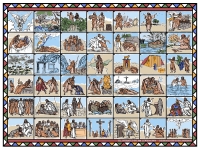Story 38

The Trial of Jesus
Matthew 26:36-75, Mark 14:10-65, Luke 22:39-23:25, John 18:1-19:16
The Bridge: Prior to the Passover, Judas went to the Pharisees and agreed to deliver Jesus for 30 pieces of silver (Matthew 26:14-16; Mark 14:10-11; Luke 22:3-6). During the Passover, Jesus told Judas that He knew that he was going to betray Him (Matthew 26:20-25).
The Story:
- After the Passover meal, they went to a Garden called Gethsemane. Jesus went off alone to pray. He prayed, “…Father, if You are willing, remove this cup from Me; yet not My will, but Yours be done” (Luke 22:42). He prayed this three times. (Matthew 26:39-45). He knew that the purpose for which the Father had sent Him was about to take place.
- “While He was still speaking, behold, Judas, one of the twelve, came up accompanied by a large crowd with swords and clubs, who came from the chief priests and elders of the people.” (Matthew 26:47).When Judas showed them Jesus, they laid their hands on Him to arrest Him.
- One of the disciples pulled out a sword and swung it and cut off the ear of the slave of the High Priest. Jesus told the disciple to put away the sword. If He wanted help, He could call thousands of angels. He told them that this must be done to fulfill the Scripture. Then He healed the slave’s ear (Matthew 26:47-56; Luke 22:47-54).
- They arrested Jesus and took Him before Caiaphas the High Priest, the elders and the scribes. The religious council sought false testimony against Jesus so that they might put Him to death. They had to have two witnesses to agree before they could convict Him, but they couldn’t find witnesses whose accounts agreed. This mock trial lasted through the night—it was during this time that Peter denied Jesus three times as Jesus had predicted (Matthew 26:31-35).
- Finally, the high priests asked, “Are you the son of the living God?” Jesus said, “I Am” (Mark 14:61-64). The words “I Am” were the same ones God used in telling Moses who He is (Story 14). Blasphemy became the charge against Jesus. According to their law, it was punishable by death. “Some began to spit at Him, and to blindfold Him, and to beat Him with their fists, and to say to Him, “Prophesy!” And the officers received Him with slaps in the face” (Mark 14:65).
- They then took Him to the Roman governor, Pilate, who found Him innocent and sent Him to Herod, who ruled the region of Galilee (Luke 23:6-16). Herod also did not find Jesus guilty and sent Him back to Pilate. Pilate again said that Jesus was not guilty of crimes deserving death, but the religious officials and the crowd convinced him to crucify Jesus (Luke 23:20-24).

What did Jesus mean when He said, “Your will be done,” after asking His Father to take the cup of suffering from Him?


